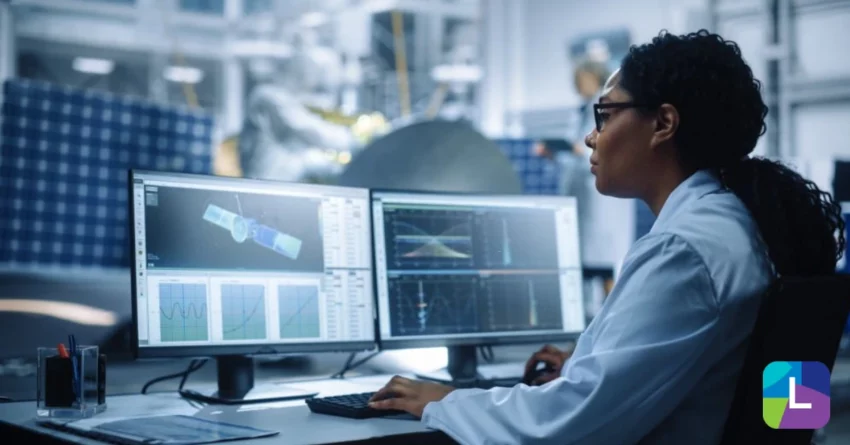World Space Week: Which Exciting Space Career Could You Do?
Discovering new anomalies deep in the universe. Uncovering new stars and signs of life. Building the next generation of telescopes. Understanding gravity and how our universe works. These are just some of the projects that workers undertake in various jobs in the name of science and space exploration.
Astronauts are the most well-known space workers, but they hold a fraction of the jobs. The logistics behind space missions require a large team of workers with a universe of skills. In fact, it takes the persistence and intelligence of designers, engineers, scientists and many more to bring a project together. The potential of what you can do or what you want to do may fit with a career in space.
History of the space age
For centuries, space was limited to what astronomers could observe from Earth. It wasn’t until the 1930’s when Germany started accelerating the first space program did it look likely to be a reality. On the 3rd October 1942, the first time man-made object was launched 52 miles above sea level marking the first artificial object entering space (using NASA figures at the time). German General Walter Dornberger claimed, “Today, the space age is born!”.
As the years passed, the official limit for the boundary of space increased to what is now 62 miles or 100 kilometres. Some of the notable or major achievements in Space exploration include; the first mammal in space (USA, 1949), the first impact on the moon (USSR, 1959), the first female in space (USSR, 1963), the first human on the moon (USA, 1969), the first space station (USSR, 1971), first multinational crewed mission (USSR & USA, 1975), first photograph of the Solar System (USA, 1990), first multinational space station (1998).
Modern space age
In many ways, space missions are built on what astronomers learned and how technology innovations benefit our daily lives. For example, solar panels, memory foam, and laser eye surgery are all items which were originally created for space missions but had secondary benefits for society.
NASA (National Aeronautics and Space Administration) has almost 18,000 people employees with only a small minority having the once-in-a-lifetime opportunity to leave Earth. However, each one of the workers is involved in the projects that do – there are missions studying phenomena, asteroids, neighbouring planets, comets and much more. In fact, there are hundreds of thousands of people all around the world who work for many different space agencies including the European Space Agency (ESA), the India Space Research Organisation (ISRO), the Japan Aerospace Exploration Agency (JAXA), the China National Space Administration (CNSA) and the Russian State Space Corporation (Roscosmos) as well as numerous private companies in logistics, engineering, software and others such as SpaceX, Blue Origin, and Boeing.
Career roles within space exploration
Space missions require workers from many different occupations. Designers, engineers, scientists, technicians, and communication and media workers are just some of the workers who often collaborate on projects. For example, scientists may want to observe the stars, and engineers will design a product while the technicians create the vision. The media workers then document the process and share the information with the public. A recent example of this is the James Webb Telescope which was launched on 21 December 2021.
There are many different roles which you can take in space exploration, but there are too many to apply. So we’ll note just a few for each section.
Scientists
Scientists usually specialise in a particular field and those who work in space are no exception. Regardless of their speciality, they all help work on the common goal to answer questions about our universe. Lots of different scientists contribute to our understanding of the universe, and they include;
- Astronomers
Astronomers observe objects in the universe including galaxies, planets and stars. They rely mostly upon Earth-based telescopes and probes sent into space. With the addition of the James Webb Telescope, astronomers now have a clearer image of the universe. Probes such as Voyager 1 and Voyager 2 have given insight into some of our neighbouring celestial bodies and have entered into interstellar space.
- Atmospheric scientists
Atmospheric scientists study weather and climate. They create short and long-term forecasts by using data from computer programs and objects such as weather balloons, satellites and radar systems. They also study meteors and atmospheric phenomena such as the Northern Lights.
- Physicists
Physicists is a broad term to use but many physicists help to study interplanetary space and stars. Their research contributes to our daily lives such as studying interactions with the Sun which affect weather and climates and help protects satellites, and aircraft communications among others.
Engineers
Engineers help solve problems by designing the equipment needed to be used on various projects. They could be used to build hardware, create new materials or simply design a new rocket. Others may help run diagnostics and tests on products. The pool of engineers is endless as agencies continue to grow and projects become continuously ambitious.
- Aerospace engineers
Aerospace engineers design, construct and test aircraft, rockets and spacecraft. In their designs, they require to take environmental limitations into consideration to tackle any obstacles preventing the mission to become successful.
- Computer engineers
Computer engineers help research, design and test computer equipment that is used on rockets, probes or other equipment. Their work can help develop new ideas for the consumer market.
- Mechanical engineers
Mechanical engineers often partner with other engineers to create products such as tools, engines, rovers or any other machine which supports space missions.
Technicians
Technicians work alongside scientists and engineers in various ways. For example, they help design new equipment or help run diagnostics and tests to make sure the equipment is safe and usable. They can also help to determine whether the weather is suitable for launching missions.
- Aerospace engineering technicians
Aerospace technicians help engineers design and develop products which will be used in space. For example, they can help set up an engine and conduct tests to see if any changes are required.
- Avionics technicians
Avionics technicians are in charge of testing any equipment related to communications, navigation, and electronic instruments on aircraft and spacecraft. They record tests and inform engineers of any changes required.
Media & Communications
Media and communications help collaborate between new technologies and space missions to the public. They use a variety of different media outlets to convey the message but they all have a similar goal in mind – explain the science in an easy format.
- Photographers
The role of a photographer is to help document the progress of a project’s mission. The photos help become a historical record from inception to launch. The photographs taken in space are not by photographers, but rather by astronauts themselves or through specially created cameras.
- Producers
Producers are in charge of budgeting, production schedule and creating images or videos for campaigns or educational purposes. They work with a number of directors and crew members to achieve their goals. The videos and images are created to help educate people on space, how the equipment works or simply a construction of a product.
- Public Relation Specialist
These workers keep the public informed about any discoveries and space activities. They can respond to requests from the media for projects or fulfil requests by educational institutions. They also help prepare information through various channels including press releases and blog entries in a way the public can understand.
Other roles
The roles above are just some of the career opportunities found within the space industry. Below are a few more roles;
- Account Manager
- Antenna Engineer
- Architect
- Business Development Manager
- Cyber Security
- Developer (Back and Front End)
- IT Manager
- Software Developer
- System Engineer
- Technical Analyst
- Technology Research & Development Engineer
- Telecommunications Engineer
- UI Developer/Designer
Interested in a STEM degree that will help shoot your career prospects with glowing lights? Don’t just dream of success. Let’s do it together. Transform your journey right here with Lendwise. *Apply online. We’ll help get on the path to success.
Representative Example: Assumed borrowing of £30,825 over 120 months at 12.73% APR representative. Monthly cost of £509.26. Total amount repayable of £61,199.65. Interest rate of 11.62% p.a.(fixed) and total fees of £925.00. Available for loan amounts between £5,000 – £100,000.
(Representative Example date: October 2024)
*Credit is subject to status and loan approval is not guaranteed. Over 18’s only. T&Cs apply.
Highs and lows of a space career
The workers in space may have different career specialisations but they all share common goals and have similarities when it comes to reaping the rewards and challenges.
Rewards
Many workers agree that bringing an idea to life is one of their role’s biggest rewards. The thrill of seeing the project progress in person as it is assembled and eventually launched into space is incredible. Workers also share their interest in space with the community or peers. Others have opportunities to try experiences which are not part of their job descriptions. This includes understanding how the body works in space by entering a zero-gravity environment or scuba diving in specially designed water tanks.
Challenges
As satisfying as the rewards of the role can be, the challenges of these jobs are immense. These workers may have to push the limits of science and technology; minor errors can be costly resulting in the loss of projects or potential lives. They also express that keeping up with technology is a constant challenge. The time required for a project can span years, even decades, and better technology options are available which can make the project seem outdated.
Space career
For a career in space, you will be required to have a level of education, previous experience or possibly training depending on the occupation you want to occupy. You can prepare for a space career as early as secondary school (senior or high school).
Skills
Among the necessary skills in order to fulfil your career duties, interpersonal and teamwork skills are required. This is due to the huge endeavour a project can take and the collaboration between departments and agencies. Typical skills would also be required to be curious, adaptable, diligent, creative, independent and work well under pressure. The success of a mission could come down to redesigning a component in a machine which could affect another component – engineers would need to set aside their frustration and solve the problem quickly.
Depending on your role, the skills required to fulfil the duties will be different as well as the education level.
Education
With the exception of most media and communication roles, every other occupation will need a certain level of qualification at the entry level. Having an interest in science is useful for anyone pursuing a career as biology, chemistry, physics, and other subjects lay the foundations of understanding space.
Mathematics and computer science is the underlying course for many who are interested in engineering, mathematics or a physicist role. Communication classes can assist by honing teamwork skills.
If you are planning to pursue a space degree, you should aim to take internships, which are readily available in different agencies. There are also opportunities to take part in part-time or full-time projects which allow the participants to engage in scientific or engineering research, development or other activities.
On the qualification level, you should aim to achieve a bachelor’s degree or associate’s degree for roles in technician, engineering and lower-ranking roles. Associate degrees sit above A-Levels and below a bachelor’s degree. Those looking to specialise in a specific area such as science, astronomy and specialist engineering should aim to undertake a master’s degree, and potentially a PhD.
To find which UK university is the best to study a STEM course, follow the link here or above on our related blogs section.
Salary
Salaries for space careers in the UK tend to sit above the average salaries across the country. Based on the 2020 Space Census, the mean salary is £49,000. Smaller organisations tend to pay a mean of £44,000 while larger organisations pay a mean of £50,000. The private sector pays more than the public sector.
The salaries increase by £9000 every 5 years up until the age of 50. Those in management and sales typically earn between £10-20,000 more than those in technical roles. Electronic engineers and computer scientists also outearn physicists and aerospace engineers.
However, these figures do not reflect each and every role. The lower entry-level roles will be at a much lower rate than those with years of experience and the salary differs depending on the role and location. Those in London and South East England will earn more to reflect the higher costs.




